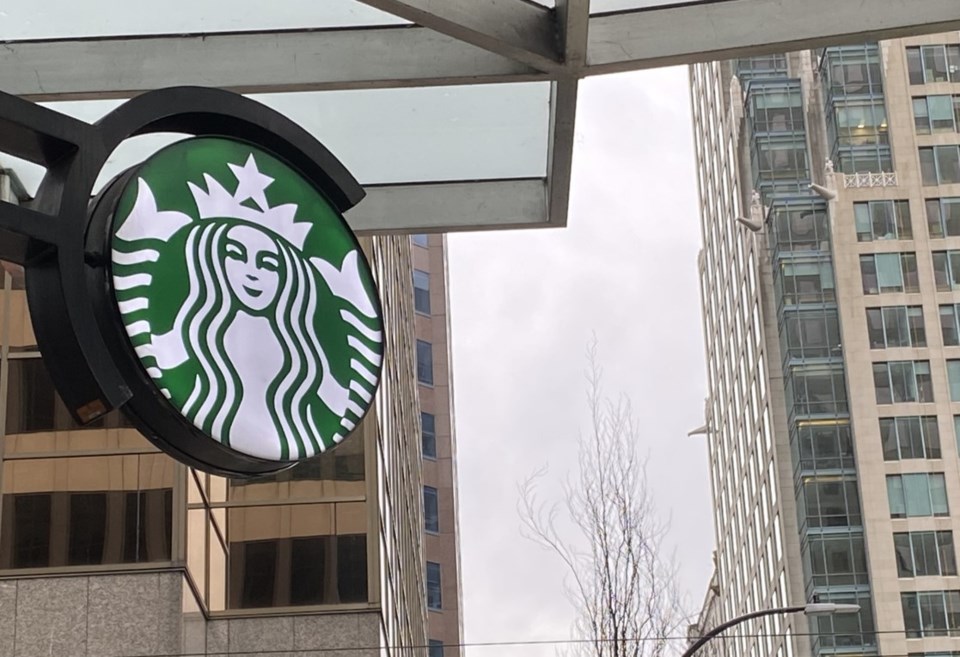Starbucks Corp. (Nasdaq:SBUX) shares soared a whopping 24.5 per cent today on news that underscored the value of having a CEO that investors respect and provided a lesson for those on boards of directors.
The coffee giant hired Chipotle Mexican Grill’s (NYSE:CMG) CEO, Brian Niccol, as CEO effective Sept. 9, while Laxman Narasimhan, who had been Starbucks’ CEO, is leaving the company effective immediately.
Chipotle’s share price today dropped 7.5 per cent, again highlighting Niccol's value.
Vancouver-based companies have also endured wild share-price swings based on which executives they employ.
Lululemon Athletica Inc. (Nasdaq:LULU) stunned the fashion world on May 22, when it announced that its well-regarded, longtime chief product officer, Sun Choe, was leaving the company. Shares fell as much as seven per cent that day.
VF Corp. (NYSE:VFC) two weeks later announced that it had hired Choe to become global brand president at its Vans division in late July. VF Corp.’s share price rose 10 per cent following that news, again underscoring Choe’s influence and esteem in the fashion world and among investors.
HwP Inc. CEO Holly Carinci told BIV this morning that having a CEO who employees and investors trust has a huge impact on corporate fortunes.
That is why top executives get paid so much.
(BIV is set to release its 2024 list of B.C.’s 100 highest-paid executives next week. Here is a link to last year's list.)
Carinci’s company helps CEOs communicate, and it coaches them in part to be aware of important social and business zeitgeists, to pay attention to those values and to be transparent about what their companies are doing to be leaders in those fields.
Niccol, who also has experience as a former CEO at Yum! Brands' (NYSE:YUM) Taco Bell, may have impressed investors in part because he started his career in brand management at Proctor & Gamble (NYSE:PG).
Having a brand consumers trust is paramount, Carinci said.
Chipotle's share price also more than quintupled under his six-plus year tenure.
Enivironmental sustainability, DEI and AI are key business zeitgeists of the 2020s
Environmental sustainability has been a key business imperative for decades, and appearing disingenuous on that issue can sour employees and investors.
Competition Bureau Canada earlier this year launched an investigation into allegations that Lululemon has used deceptive marketing and essentially claimed to have more sustainable products than is the case – something critics often dub “greenwashing.”
The accusations from environmental activists at Stand.earth coincided with Lululemon’s share price sliding by more than 52 per cent as of the close of markets today.
“It's getting quite scary with climate change,” Carinci said.
“Maybe there's a way that a company has made choices for 150 years. Is there a better way to make a choice now? Can we do something in a bit of a different direction now that we know a lot more? Generally speaking, the answer is yes.”
Another dominant business zeitgeist in the 2020s is the buzz-acronym DEI, for diversity, equity and inclusion. That means having a workforce that reflects the population and a management that treats workers fairly while embracing employees and enabling them to make meaningful contributions.
The number of CEOs on earnings calls now discussing artificial intelligence (AI) shows that this technology is another business imperative that CEOs need to pay attention to and communicate how they are taking action to stay innovative.
Once CEOs build reputations for being able to tap into understanding what the public – and investors – think is important, they become valuable enough to companies to merit the large compensation packages many bring home, she said.
Carinci equated their value to Hollywood stars on theatres’ marquee signs, and why the United States Olympic & Paralympic Committee chose to include Tom Cruise in its presentation in the 2024 Olympic Games closing ceremony, which was to symbolically show that the next Olympic Games is to be held in Los Angeles.
“You want to have a name that people recognize – somebody you trust,” she said. “That's why you see the stock going down in one company when they leave and going up in another company when they take the reins over there.”



